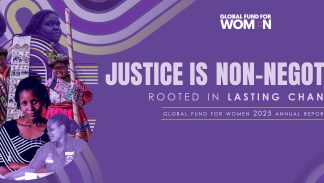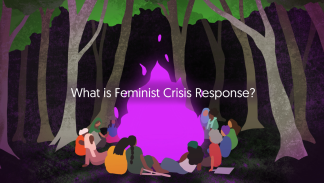Gender Justice Issues
Girls’ Rights

What Are Girls’ Human Rights?
Girls’ Human Rights are articulated in the Universal Declaration of Human Rights, the Convention of the Rights of the Child, and the Convention on the Elimination of All Forms of Discrimination Against Women. These international treaties outline the rights of girls and gender-expansive youth—spanning social, economic, political, and cultural rights, among others.
Across the globe, wherever there are movements for gender justice, girls and gender- expansive young people are leading the way. They are creating climate-just futures, ending period poverty and fighting for equal access to education for all.
As feminist funders, we are committed to resourcing intersectional and intergenerational work. Because we believe that bold, girl-led movements can create lasting change when they have the resources they need to lead.
What are the Barriers to Securing Girls’ Human Rights?
Adolescent girls face multiple levels of discrimination based on their age and gender, and other intersecting identities—such as ethnicity, sexuality, or disability. Girls’ disadvantage is further intensified by the violence, insecurity, unequal opportunities, harmful gender norms, and other systemic barriers that threaten their lives and rob them of their potential.
In fact, 60 percent of undernourished people worldwide are girls or women (Women and Hunger Facts). Andif the current trend continues, one in three girls can expect to be the target of some form of gender-based violence during their lifetime. This includes the more than 12 million girls who are married before the age of 18 each year—a practice that puts girls at higher risk of HIV, violence, and even death (World Health Organization).
According to UNESCO estimates, around the world, 129 million girls are out of school, including 32 million of primary school age, and 97 million of secondary school age.
In spite of these challenges, girls, young women, and non-binary youth are leveraging online platforms, mobilizing communities, leading local organizations, influencing policy decisions, advocating for their rights and fighting for more equal, democratic futures. Yet, young feminist organizers are often underfunded. There’s a persistent assumption in philanthropy that youth-led groups cannot absorb large grants. But flexible, long-term funding is exactly what allows groups to build capacity, deepen their organizing, and grow sustainably. At Global Fund for Women, youth-led organizations are resourced at the same levels as other movement partners—because transformative work demands transformative investment.
“Lucera was born from the need to highlight the experiences of young people (including our own) with discrimination and racism, as we identified a lack of spaces to address these issues from a youth perspective. Our struggle for equality and non-discrimination involves considering the multiple violence and their impact, always defending the rights of children and youth.”
How Our Partners Are Supporting Girls’ Rights
In Tanzania, our partners are advocating for sexual and reproductive justice. They are groups led by young people and women under 35, with the voices of adolescent girls’ guiding them at every step into. Their programs address school dropouts, teen pregnancy, girl’s leadership, livelihoods and more. They support referrals to safe abortion and youth-centered sexuality education, while also working with schools and universities on capacity building for young women and girls.
In Peru, anti-racist youth collectives are fighting state repression, political setbacks, and systemic violence. Their approach includes digital advocacy, publishing material about racial and gender justice, and hosting events to discuss youth experiences and
structural inequalities. Global Fund for Women’s support has helped them expand their reach in educating young people on abusive relationships, reporting violence and caring for their sexual and reproductive health.
In Uganda, girls and young people are working with rural and Indigenous youth and children to fight for their land, water, and food sovereignty. Our climate justice partners have successfully campaigned to shut down factories that were polluting community water streams in Jeru. Now, they are building energy saving stoves, creating organic biopesticides, training cohorts of climate fellows, and teaching a climate curriculum at 60 schools across Uganda.
Young feminists are leaders in their own right already and deserve power and a voice to shape feminist movements now. Young people—particularly adolescent girls—are driving today’s gender justice movements and working towards building a more just and equitable world.


